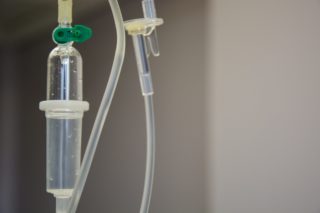When I was diagnosed with malignant malinoma in November 2011, it was almost impossible for me and my family to accept. Immunotherapy, however, changed my story.
Diagnosis and treatment
I had not experienced any symptoms. I was sitting in the lounge one night when I noticed that a mole on my leg had grown bigger and there was something strange about how it looked. Because there is a fair amount of information out there on skin cancer, I made an appointment with my doctor and went to have it removed. The mole was biopsied and the diagnosis cam back.
I had stage III malignant melanoma, the most serious form of skin cancer.
I underwent treatment with a regimen that was available at the time for a year. The impact of the treatment on my life was substantial. I ran a large company and it was extremely taxing to undergo treatment which left me feeling nauseous and exhausted. It was an exceptionally challenging time. My family was enormously supportive of me through this period and they helped me to get through it. In 2013 I went for a Positron-emission tomography (PET) scan and the report came back clear.
At first, my life returned to normal.
But then in 2015, I went for another test and it was discovered that the melanoma had spread to the lymph nodes in my groin. We were devastated. The psychological impact on all of us was dreadful. The cancer had returned and was spreading; it needed to be swiftly treated to prevent it from reaching other areas of my body.
New treatment – Immunotherapy 
My husband asked the oncologist, “What would you do if this was your wife?” His answer was unequivocal: I would offer her immunotherapy. It was a newer treatment that had shown a lot of promise in treating advanced melanomas. My oncologist recommended it because he had travelled substantially and had been involved with the drug trials when they first came out. He had also educated himself on the whole process of administering the treatment and measuring its effects. He was convinced that it was the best route to take for my particular disease.
But the problem was that it was neither available nor registered in South Africa. With the oncologist’s help, we got permission from the Medicines Control Council (MCC) and we then ordered a type of immunotherapy that workd by helping the immune system do what it was meant to do: detect and fight cancer cells. We had to wait two months for the medicine to arrive in the country from the U.S. It was agonizing as every day that went by, the risk of the cancer spreading was increased. This shows the dire need for immunotherapy drugs, which are gradually becoming available in SA. I experienced enormous anxiety, and my family felt helpless. My daughter had made plans to study overseas but she puts these on hold as she was not prepared to leave me.
Then the medicine arrived. It’s administered as an intravenous infusion, so I would go to the doctor’s rooms for treatment, which took around two hours per session. I had several courses of treatment over the period of a year, ending in December 2015. The negative impact on my life this second time around was minimal, and my health and lifestyle improved. I continued to work, I travelled overseas and was able to get on with my life. For me, the side effects were minimal, and the benefit outweighed any effects. There was no nausea or hair loss in my case. The fact that I didn’t feel so sick was such a positive outcome of this treatment, and it helped to lift the anxiety and stress that I had been experiencing. I also have the peace of mind knowing that if the cancer were ever to return, I can have the same treatment again.
I continued to work, I travelled overseas and was able to get on with my life. For me, the side effects were minimal, and the benefit outweighed any effects. There was no nausea or hair loss in my case. The fact that I didn’t feel so sick was such a positive outcome of this treatment, and it helped to lift the anxiety and stress that I had been experiencing. I also have the peace of mind knowing that if the cancer were ever to return, I can have the same treatment again.
Want to know how to lower your cancer risk?
The benefits of immunotherapy cannot be overstated.
I sound evangelical when I talk about it, but it helped me save and improve my life, and did so in the least invasive way possible. Since then, I have been in the best of health. Four months after I completed the treatment, I ran my first ever half-marathon. I would like to advise people to avoid getting sun-burnt, seek out the shade, use a broad-spectrum UVA/UVB sunscreen whenever they go outside, and to see their physician every year for a professional skin exam. And to people who have melanoma, please don’t see it as the death sentence it once was. Also, don’t Google – talk to an oncologist who is up to date with the latest treatments – and never be scared to go with the science.



![women [longevity live]](https://longevitylive.com/wp-content/uploads/2020/01/photo-of-women-walking-down-the-street-1116984-100x100.jpg)










